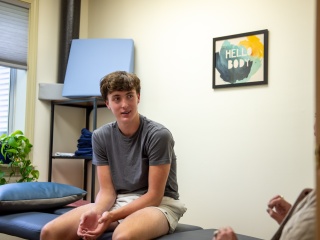Spina Bifida
Spina Bifida Care at Golisano Children’s Hospital
Spina bifida occurs when the lower spinal bones don’t form properly around part of the spinal cord. Depending on the severity of the disease, spina bifida can cause mild to severe symptoms that affect your child’s nerves, urinary system, gastrointestinal tract, brain and bones.
It can be overwhelming to know your child has a complex medical condition. At Golisano Children’s Hospital at University of Vermont Health, we’re by your family’s side throughout your journey with compassion and support. The experts in our Spina Bifida Program work together to create a targeted, personalized treatment plan aimed at helping your child live their best, most fulfilling life. We get to know your child and your family to understand your unique needs. You’ll always speak with someone familiar with your child’s story and treatment.
Why Choose Golisano Children's Hospital?
As the only spina bifida program in Vermont and northern New York, we offer:
- Coordinated services: Your child has access to all necessary providers in one visit. The team includes pediatric nephrology, pediatric urology, pediatric neurosurgery, pediatric gastroenterology, Child Life specialists, a nutrition specialist and an orthotist. We also coordinate lab tests and imaging.
- Access to resources: We work with the Spina Bifida Association of Greater New England, an affiliated chapter of the National Spina Bifida Association. This may give you access to financial support and educational and social events.
- Research-based treatment: As part of a health system anchored by an academic medical center, our physicians are active researchers. Your child receives care from a team that brings you the most up-to-date options.
Types of Spina Bifida
There are three main types of spina bifida:
- Spina bifida occulta: You typically can’t see any defect. Visible signs include a birthmark, dimple or hairy patch on your child’s back.
- Meningocele: Part of your child’s spinal cord pushes out of the spinal column, usually without nerve damage.
- Myelomeningocele: Part of your child’s spinal cord, along with spinal nerves, push out through the spine.
Spina Bifida Symptoms
Spina bifida affects your child in different ways, depending on what type they have and how severe it is. It is important to talk to your doctor to know what to expect for your child. Children may experience symptoms that affect multiple organs throughout their body, such as:
- Difficulty controlling their bladder or bowels
- Fluid buildup and pressure in the brain (hydrocephalus)
- Learning problems
- Abnormal sensation or movement in their feet, legs or arms
- Skeletal symptoms, such as a curved spine (scoliosis) or differences in lower extremities
Spina Bifida Treatment
Sometimes, spina bifida care starts before a baby is born. An unborn child may be diagnosed with spina bifida through a fetal ultrasound or blood test. Babies with spina bifida may require neurosurgery shortly after birth. Our team can meet with you before your baby is born to help you understand the diagnosis, your care options and what to expect during and after delivery.
Other families come to us when a child is older with an established diagnosis. In these cases, we collect and review all your child’s medical records, imaging and tests before the first appointment. During the visit, your child’s physicians create an effective, personalized treatment plan.
We coordinate ongoing care based on your child’s needs, which may include annual or bi-annual visits. Your child’s care may include specialists from multiple departments, including:
Pediatric neurosurgeons may provide surgical care or follow-up treatment after surgery, such as for children with shunts for hydrocephalus.
Spina bifida may affect your child’s bladder function. A pediatric urologist specializes in urinary problems in children with the goal of preserving kidney function and optimizing children’s ability to be dry.
Without treatment, bladder dysfunction can lead to kidney damage. Pediatric nephrologists specialize in problems affecting your child’s kidneys. Our pediatric nephrologist also helps to coordinate your child’s ongoing care. They work with you and your pediatrician to help your child get the resources they need, such as school accommodations or referrals for neuropsychological testing.
In some cases, spina bifida causes nerve damage that affects bowel function. A pediatric gastroenterologist treats symptoms such as stool leakage or significant constipation in addition to other issues with the GI system.
Adequate nutrient intake and maintaining a healthy weight are important for children with spina bifida. A nutritionist works with your family to develop feeding plans that meet your child’s needs.
An orthotist is a specialist who designs and fits specialized braces and splints. We partner with a regional orthotics team to make your child’s brace checks and fittings more convenient.
A physiatrist, or physical medicine and rehabilitation physician, specializes in treating conditions that affect function and helps maximize mobility. Our program coordinates care with physiatrists as needed.
Child Life Program
Medical care can be overwhelming for children. Our Child Life Specialists help your child cope with stress, prepare for procedures and understand their care. These highly trained specialists offer your family support as you navigate our health system.

Locations Near You
Share your location to see nearby providers and availability
111 Colchester Avenue
Burlington, VT 05401-1473


